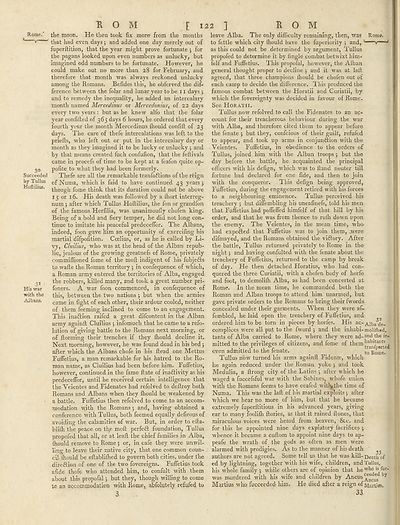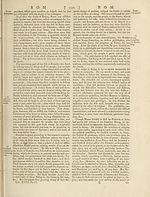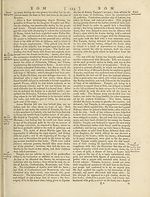Encyclopaedia Britannica, or, a Dictionary of arts, sciences, and miscellaneous literature : enlarged and improved. Illustrated with nearly six hundred engravings > Volume 18, RHI-SCR
(130) Page 122
Download files
Complete book:
Individual page:
Thumbnail gallery: Grid view | List view

Rome.'
3°
Succeeded
»y Tullus
Hoftilius.
31
His war
with the
Aibans.
R O M
the moon. He then took fix more from the months
that had even days j and added one day merely out of
fuperftition, that the year might prove fortunate j for
the pagans looked upon even numbers as unlucky, but
imagined odd numbers to be fortunate. However, he
could make out no more than 28 for February, and
therefore that month was always reckoned unlucky
among the Romans. Befides this, he obferved the dif¬
ference between the folar and lunar year to be 11 days ;
and to remedy the inequality, he added an intercalary
month named Mercedinus or Mercedonius, of 22 days
every two years : but as he knew alfo that the folar
year confided of 365 days 6 hours, he ordered that every
fourth year the month Mercedinus fhould confift of 23
days. The care of thefe intercalations was left to the
priefts, who left out or put in the intercalary day or
month as they imagined it to be lucky or unlucky \ and
by that means created fuch confufion, that the feftivals
came in procefs of time to be kept at a feafon quite op-
pofite to what they had been formerly.
Thefe are all the remarkable tranfaftions of the reign
of Numa, which is faid to have continued 43 years j
though fume think that its duration could not be above
15 or 16. His death was followed by a (hort interreg¬
num $ after which Tullus Hoftilius, the fon or grandfon
of the famous Herfilia, was unanimoufly chofen king.
Being of a bold and fiery temper, he did not long con¬
tinue to imitate his peaceful predecelfor. The Albans,
indeed, foon gave him an opportunity of exercifing his
martial difpofition. Coelius, or, as he is called by Li¬
vy, C/uilius, who was at the head of the Alban repub¬
lic, jealous of the growing greatnefs of Rome, privately
commiftioned fome of the moft indigent of his fubjedls
to wafte the Roman territory $ in confequence of which,
a Roman army entered the territories of Alba, engaged
the robbers, killed many, and took a great number pri-
foners. A war foon commenced, in confequence of
this, between the two nations j but when the armies
came in fight of each other, their ardour cooled, neither
of them feeming inclined to come to an engagement.
This inaftion raifed a great difeontent in the Alban
army againft; Cluilius ; infomuch that he came to a refo-
lution of giving battle to the Romans next morning, or
of ftorming their trenches if they fhould decline it.
Next morning, however, he was found dead in his bed j
after which the Albans chofe in his ftead one Mettus
Fuffetius, a man remarkable for his hatred to the Ro¬
man name, as Cluilius had been before him. Fuffetius,
however, continued in the fame ftate of inadfivity as his
predeceffor, until he received certain intelligence that
the Veientes and Fidenates had refolved to deflroy both
Romans and Albans when they fhould be weakened by
a battle. Fuffetius then refolved to come to an accom¬
modation with the Romans •, and, having obtained a
conference v'ith Tullus, both feemed equally defirous of
avoiding the calamities of wTar. But, in order to efta-
blifh the peace on the rnofl perfect foundation, Tullus
propofed that all, or at leaft the chief families in Alba,
fhould remove to Rome; or, in cafe they were unwil¬
ling to leave their native city, that one common coun-
cil fhould be eftablifhed to govern both cities, under the
direftion of one of the two fovereigns. Fuffetius took
afide thofe who attended him, to confult Avith them
about this propofal; but they, though Avilling to come
Vo an accommodation Avith Rome, abfolutely refufed to
3
ROM
leave Alba. The only difficulty remaining, then, was Rome,
to fettle which city fhould have the fuperiority ; and, 1 1 v |J
as this could not be determined by argument, Tullus
propofed to determine it by fingle combat betwixt him-
felf and Fuffetius. This propofal, however, the Alban
general thought proper to decline 5 and it Avas at laft:
agreed, that three champions fhould be chofen out of
each camp to decide the difference. This produced the
famous combat betAveen the Horatii and Curiatii, by
which the fovereignty Avas decided in favour of Rome.
See Horatii.
Tullus noAV refolved to call the Fidenates to an ac¬
count for their treacherous behaviour during the war
Avith Alba, and therefore cited them to appear before
the fenate j but they, confcious of their guilt, refufed
to appear, and took up arms in conjundtion Avith the
Veientes. Fuffetius, in obedience to the orders of
Tullus, joined him Avith the Alban troops j but the
day before the battle, he acquainted the principal
officers with his defign, Avhich Avas to ftand neuter till
fortune had declared for one fide, and then to join
Avith the conqueror. This defign being approved,
Fuffetius, during the engagement retired with his forces
to a neighbouring eminence. Tullus perceived his
treachery ) but diffembling his uneafinefs, told his men
that Fuffetius had poffeffed himfelf of that hill by his
order, and that he was from thence to rufh down upon
the enemy. The Veientes, in the mean time, who
had expeded that Fuffetius Avas to join them, were
difmayed, and the Romans obtained the vidory. After
the battle, Tullus returned privately to Rome in the
night ; and having confulted with the fenate about the
treachery of Fuffetius, returned to the camp by break
of day. He then detached Horatius, Avho had con¬
quered the three Curiatii, Avith a chofen body of horfe
and foot, to demolifh Alba, as had been concerted at
Rome. In the mean time, he commanded both the
Roman and Alban troops to attend him unarmed, but
gave private orders to the Romans to bring their fwords
concealed under their garments. When they were aft.
fembled, he laid open the treachery of Fuffetius, and
ordered him to be torn in pieces by horfes. His ac- Alba'de-
complices Avere all put to the fword 5 and the inhabi-moliflied,
tants of Alba carried to Rome, where they Avere ad- and the in-
mitted to the privileges of citizens, and fome of them habitants
, . t tranfpartea
eA’en admitted to the fenate. t0 Rome>
Tullus notv turned his arms againft Fidente, which
he again reduced under the Roman yoke ; and took
Medulia, a ftrong city of the Latins •, after which he
waged a fuccefsful Avar with the Sabines, whofe union
with the Romans feems to ha\'e ceafed Avith* the time of
Numa. This Avas the laft; of his martial exploits j after
which we hear no more of him, but that he became
extremely fuperftitious in his advanced years, giving
ear to many foolifli ftories, as that it rained ftones, that
miraculous voices Avere heard from heaven, &c. and
for this he appointed nine days expiatory facrifices ;
Avhence it became a cuftom to appoint nine days to ap-
peafe the wrath of the gods as often as men Avere
alarmed Avith prodigies. As to the manner of his death ^
authors are not agreed. Some tell us that he Avas kill-Deathof
ed by lightning, together'with his wife, children, and Tullus,
his whole family ; Avhile others are of opinion that he wllC) fuc-
Avas murdered Avith his Avife and children by Ancus^‘®s y
Martins who fucceeded him. He died after a reign of Martins.
33
[ 122 ]
3°
Succeeded
»y Tullus
Hoftilius.
31
His war
with the
Aibans.
R O M
the moon. He then took fix more from the months
that had even days j and added one day merely out of
fuperftition, that the year might prove fortunate j for
the pagans looked upon even numbers as unlucky, but
imagined odd numbers to be fortunate. However, he
could make out no more than 28 for February, and
therefore that month was always reckoned unlucky
among the Romans. Befides this, he obferved the dif¬
ference between the folar and lunar year to be 11 days ;
and to remedy the inequality, he added an intercalary
month named Mercedinus or Mercedonius, of 22 days
every two years : but as he knew alfo that the folar
year confided of 365 days 6 hours, he ordered that every
fourth year the month Mercedinus fhould confift of 23
days. The care of thefe intercalations was left to the
priefts, who left out or put in the intercalary day or
month as they imagined it to be lucky or unlucky \ and
by that means created fuch confufion, that the feftivals
came in procefs of time to be kept at a feafon quite op-
pofite to what they had been formerly.
Thefe are all the remarkable tranfaftions of the reign
of Numa, which is faid to have continued 43 years j
though fume think that its duration could not be above
15 or 16. His death was followed by a (hort interreg¬
num $ after which Tullus Hoftilius, the fon or grandfon
of the famous Herfilia, was unanimoufly chofen king.
Being of a bold and fiery temper, he did not long con¬
tinue to imitate his peaceful predecelfor. The Albans,
indeed, foon gave him an opportunity of exercifing his
martial difpofition. Coelius, or, as he is called by Li¬
vy, C/uilius, who was at the head of the Alban repub¬
lic, jealous of the growing greatnefs of Rome, privately
commiftioned fome of the moft indigent of his fubjedls
to wafte the Roman territory $ in confequence of which,
a Roman army entered the territories of Alba, engaged
the robbers, killed many, and took a great number pri-
foners. A war foon commenced, in confequence of
this, between the two nations j but when the armies
came in fight of each other, their ardour cooled, neither
of them feeming inclined to come to an engagement.
This inaftion raifed a great difeontent in the Alban
army againft; Cluilius ; infomuch that he came to a refo-
lution of giving battle to the Romans next morning, or
of ftorming their trenches if they fhould decline it.
Next morning, however, he was found dead in his bed j
after which the Albans chofe in his ftead one Mettus
Fuffetius, a man remarkable for his hatred to the Ro¬
man name, as Cluilius had been before him. Fuffetius,
however, continued in the fame ftate of inadfivity as his
predeceffor, until he received certain intelligence that
the Veientes and Fidenates had refolved to deflroy both
Romans and Albans when they fhould be weakened by
a battle. Fuffetius then refolved to come to an accom¬
modation with the Romans •, and, having obtained a
conference v'ith Tullus, both feemed equally defirous of
avoiding the calamities of wTar. But, in order to efta-
blifh the peace on the rnofl perfect foundation, Tullus
propofed that all, or at leaft the chief families in Alba,
fhould remove to Rome; or, in cafe they were unwil¬
ling to leave their native city, that one common coun-
cil fhould be eftablifhed to govern both cities, under the
direftion of one of the two fovereigns. Fuffetius took
afide thofe who attended him, to confult Avith them
about this propofal; but they, though Avilling to come
Vo an accommodation Avith Rome, abfolutely refufed to
3
ROM
leave Alba. The only difficulty remaining, then, was Rome,
to fettle which city fhould have the fuperiority ; and, 1 1 v |J
as this could not be determined by argument, Tullus
propofed to determine it by fingle combat betwixt him-
felf and Fuffetius. This propofal, however, the Alban
general thought proper to decline 5 and it Avas at laft:
agreed, that three champions fhould be chofen out of
each camp to decide the difference. This produced the
famous combat betAveen the Horatii and Curiatii, by
which the fovereignty Avas decided in favour of Rome.
See Horatii.
Tullus noAV refolved to call the Fidenates to an ac¬
count for their treacherous behaviour during the war
Avith Alba, and therefore cited them to appear before
the fenate j but they, confcious of their guilt, refufed
to appear, and took up arms in conjundtion Avith the
Veientes. Fuffetius, in obedience to the orders of
Tullus, joined him Avith the Alban troops j but the
day before the battle, he acquainted the principal
officers with his defign, Avhich Avas to ftand neuter till
fortune had declared for one fide, and then to join
Avith the conqueror. This defign being approved,
Fuffetius, during the engagement retired with his forces
to a neighbouring eminence. Tullus perceived his
treachery ) but diffembling his uneafinefs, told his men
that Fuffetius had poffeffed himfelf of that hill by his
order, and that he was from thence to rufh down upon
the enemy. The Veientes, in the mean time, who
had expeded that Fuffetius Avas to join them, were
difmayed, and the Romans obtained the vidory. After
the battle, Tullus returned privately to Rome in the
night ; and having confulted with the fenate about the
treachery of Fuffetius, returned to the camp by break
of day. He then detached Horatius, Avho had con¬
quered the three Curiatii, Avith a chofen body of horfe
and foot, to demolifh Alba, as had been concerted at
Rome. In the mean time, he commanded both the
Roman and Alban troops to attend him unarmed, but
gave private orders to the Romans to bring their fwords
concealed under their garments. When they were aft.
fembled, he laid open the treachery of Fuffetius, and
ordered him to be torn in pieces by horfes. His ac- Alba'de-
complices Avere all put to the fword 5 and the inhabi-moliflied,
tants of Alba carried to Rome, where they Avere ad- and the in-
mitted to the privileges of citizens, and fome of them habitants
, . t tranfpartea
eA’en admitted to the fenate. t0 Rome>
Tullus notv turned his arms againft Fidente, which
he again reduced under the Roman yoke ; and took
Medulia, a ftrong city of the Latins •, after which he
waged a fuccefsful Avar with the Sabines, whofe union
with the Romans feems to ha\'e ceafed Avith* the time of
Numa. This Avas the laft; of his martial exploits j after
which we hear no more of him, but that he became
extremely fuperftitious in his advanced years, giving
ear to many foolifli ftories, as that it rained ftones, that
miraculous voices Avere heard from heaven, &c. and
for this he appointed nine days expiatory facrifices ;
Avhence it became a cuftom to appoint nine days to ap-
peafe the wrath of the gods as often as men Avere
alarmed Avith prodigies. As to the manner of his death ^
authors are not agreed. Some tell us that he Avas kill-Deathof
ed by lightning, together'with his wife, children, and Tullus,
his whole family ; Avhile others are of opinion that he wllC) fuc-
Avas murdered Avith his Avife and children by Ancus^‘®s y
Martins who fucceeded him. He died after a reign of Martins.
33
[ 122 ]
Set display mode to:
![]() Universal Viewer |
Universal Viewer | ![]() Mirador |
Large image | Transcription
Mirador |
Large image | Transcription
Images and transcriptions on this page, including medium image downloads, may be used under the Creative Commons Attribution 4.0 International Licence unless otherwise stated. ![]()
| Permanent URL | https://digital.nls.uk/193020397 |
|---|
| Attribution and copyright: |
|
|---|
| Description | Ten editions of 'Encyclopaedia Britannica', issued from 1768-1903, in 231 volumes. Originally issued in 100 weekly parts (3 volumes) between 1768 and 1771 by publishers: Colin Macfarquhar and Andrew Bell (Edinburgh); editor: William Smellie: engraver: Andrew Bell. Expanded editions in the 19th century featured more volumes and contributions from leading experts in their fields. Managed and published in Edinburgh up to the 9th edition (25 volumes, from 1875-1889); the 10th edition (1902-1903) re-issued the 9th edition, with 11 supplementary volumes. |
|---|---|
| Additional NLS resources: |
|

